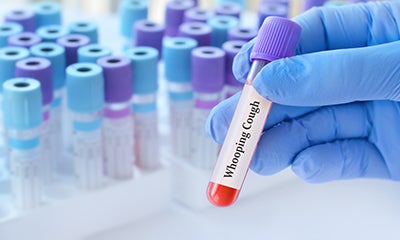Birmingham, Ala. (Dec. 18, 2024) — Pediatricians say the number of whooping cough cases in the United States continues to rise, with several outbreaks at schools reported in Alabama.
Whooping cough, also known as pertussis, is an infection of the airway and lungs caused by a bacteria called Bordetella pertussis. Once the infection causes the characteristic cough, the damage to the airway and lungs is already done, and antibiotics do not change the course of the illness, which typically lasts weeks to months.
The best way to prevent infection is through vaccination. Babies younger than 6 months are at risk of dying from pertussis, but vaccination of the mother during pregnancy protects the baby until the baby can receive their infant vaccinations. Children should receive their pertussis booster vaccine at age 11.
“Pertussis (whooping cough) is very contagious, especially if the infected person is around vulnerable people,” said Maria Rueda Altez, M.D. Director of Transplant Infectious Diseases at Children’s of Alabama. “This includes infants, the elderly, people with weak immune systems, or people who have not been vaccinated.”
Altez says the bacteria spread from person to person through tiny drops of fluid from an infected person’s mouth or nose. These become airborne when someone sneezes, coughs, or laughs. Whooping cough can have different symptoms. The first symptoms are similar to those of a common cold:
• Runny Nose
• Sneezing
• Mild Cough
• Low-grade fever
Whooping cough causes severe coughing spells, sometimes resulting in a “whooping” sound when the child breathes in. Once the coughing starts, the damage to the airway is primarily done, and antibiotics do little to alter the course of the disease.
“It is very important that we diagnose as early as possible because treated after one or two weeks of symptom offset, the treatment may not be as effective,” said Altez.
It is not unusual for severe coughing to continue for weeks; full recovery can take several months. Babies less than 6 months are at risk of dying from this infection, and it is important that a health professional closely monitors babies.
In addition to the antibiotics and early diagnosis, Altez says it is also crucial for parents to make sure their child stays hydrated. Also, try to portion out meals in smaller sizes to prevent vomiting if a coughing spell begins.
According to the Alabama Department of Public Health, more than 250 confirmed cases of whooping cough have been diagnosed in the state of Alabama as of Dec.5.
Children should receive the DTaP vaccine (diphtheria, tetanus, and pertussis) at:
• 2 months
• 4 months
• 6 months
• 15-18 months
• 4-6 years
Children ages 11-12 should get a shot of the new combination booster called Tdap, as protective antibodies from the baby series start decreasing. To protect newborn babies, all pregnant women should receive the Tdap vaccine during the second half of each pregnancy, as well as those who will care for infants.
Altez also recommends that parents continue to stress the importance of handwashing, encourage their children to cover their mouths when coughing or sneezing, and wear masks if they feel sick.
For more information on whooping cough, click here.

















